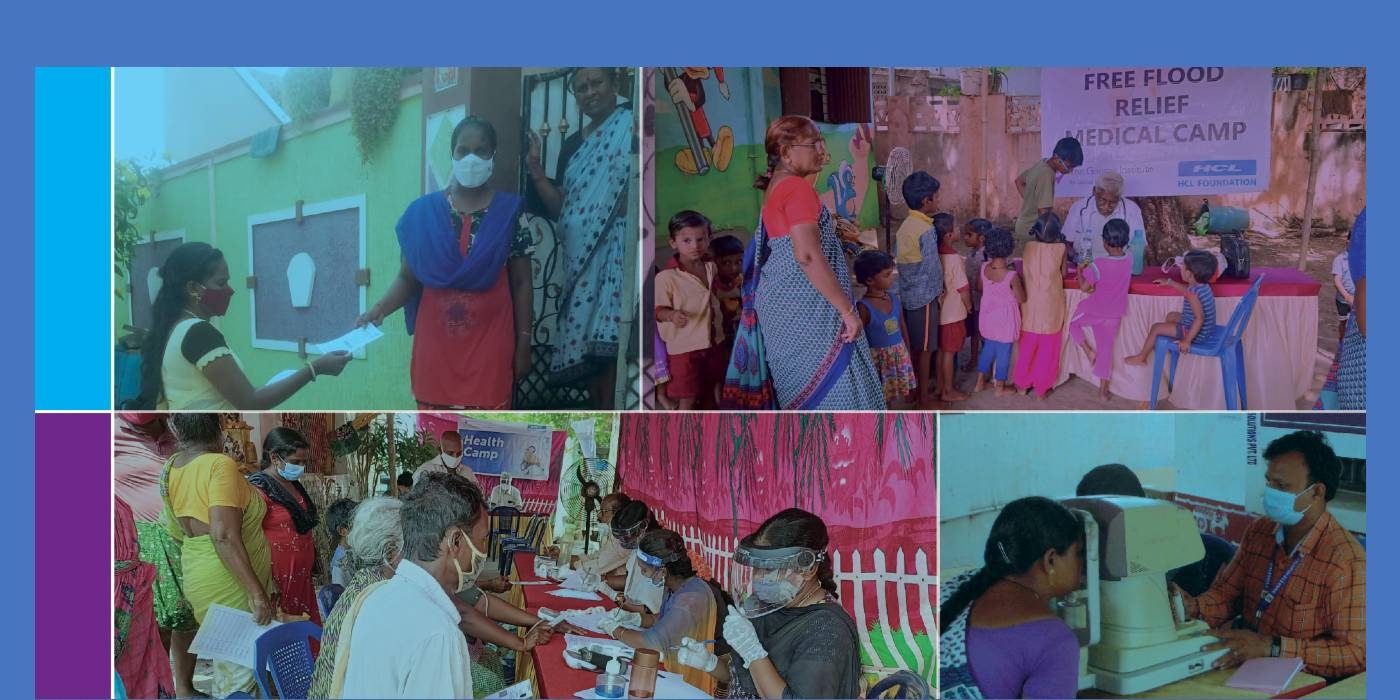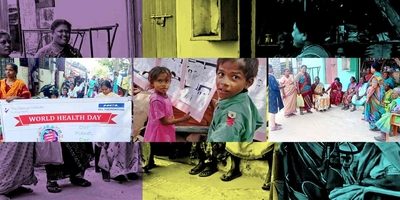
Community engagement for better health and healthier societies
Welcome to our blog series, “Community Engagement for Better Health and Healthier Societies” where we delve into the impactful initiatives undertaken by The George Institute for Global Health India, supported by HCL Foundation. In this series, we will explore the transformative efforts aimed at strengthening outreach health services in urban slums and peri urban areas in Andhra Pradesh. Join us as we take you through the 5 years of our journey during the implementation of our project, “Strengthening Outreach Health Services in Urban Slums of Vijayawada and Peri Urban Areas In Gannavaram, Andhra Pradesh” that officially started in January 2018.
In this first blog of the series, we will take you through the importance of strengthening healthcare system, and challenges of urban slum residents in utilising these services to improve their health and awareness on healthcare. The initiatives taken to improve availability, accessibility, and affordability of health care for all age groups and both genders in low-income groups.
Blog 1: Improving health in urban slums through outreach activities
Living in urban slums can be tough. People here face many health problems due to various social, economic, and environmental factors; they face challenges such as the inability to afford healthcare during emergencies and a lack of social support, particularly since many are migrants. Additionally, they do not have access to minimum basic facilities such as safe drinking water and drainage system. They are stigmatised to sensitive issues like breast cancer or menstrual hygiene
As per census 2011, in Vijayawada, 4.26 Cr urban poor population was living in slums which was expected to reach 7.66 Cr by 2021. Due to the COVID-19, 2021 census was not conducted. According to United Nations projections, a rapid increase in the number of urban poor population is predicted to grow by 46% by 2030 in India. A National Urban Health Mission (NUHM) framework was launched to tackle urban infrastructure and health issues for immediate attention from a public health perspective.
NUHM framework discussed about models designed through community-led action for strengthening health delivery system. These included initiatives like improving labour and resources; involving communities to participate in planning and management through healthcare delivery; establishing community link volunteers (Accredited Social Health Activist-ASHA); and capacity building of stakeholders. The focus of the mission was to create awareness to increase demand for services. Outreach health camps for communities to utilise health services were also recommended.
Keeping this in perspective, a team from the George Institute for Global Health India implemented outreach health services to improve healthcare delivery and utilisation in 10 urban slums of Vijayawada with the support from HCL Foundation. The key outreach activity was to conduct health camps in the communities for general health check-up, eye check-up, and follow-up of pregnant and lactating mothers. The intention was to understand the existing health conditions in the community and identify any cases that require treatment and follow-up.
The project started by observing and understanding the awareness on health-related concerns, challenges in utilisation of health services, and health-seeking behaviour of the people living in these areas.
During the conduct of health camps, we found that the care sought was maximum for Musculoskeletal Disorders (conditions of bones and joints), Non-Communicable Diseases (NCDs) (like high blood pressure/hypertension, diabetes, cancer, heart-related conditions, and others), and other non-specific health conditions (like cough, headache, diarrhoea, weakness, etc).
Most people who visited the camps were unaware of their health condition or if aware, did not manage to procure the medications. They visited camps mostly for screening purposes and to obtain the medications from health camps which in normal situation is difficult to obtain for them.
Subhaiya (name changed), a 73-year-old male resident of Karakatta living with his son, is a daily wage earner. He sells flowers to make a living. He uses blood pressure lowering medications, he complains that these medicines give him burning sensation in the stomach and so he discontinued the tablets. Subhaiya has to visit the hospital every 5- 10 day to collect the medicine for high blood pressure. These visits cost him his daily wage which is also a reason for his lack in adhering to the treatment. He purchases the medicines from a nearby medical store to save time in travel and waiting time for doctor’s consultation at the government facility. He also did not trust the medicine provided by the government facility because he complains of weakness and swelling in his legs.
“I feel better when I take medicine, but when I stop taking the tablets, I feel weak and have giddiness. The hospital gives tablets only for 5 days. I am old and cannot travel much.”
“As I do not want to miss my daily wage, I purchase tablets from medical store to reduce the swelling in my legs.”
In Subhaiya’s case, we can see the challenge of an urban slum resident who is a daily wage earner with little to no time to spare every alternate week to visit hospital and collect medicine. He either preferred to consult the local Registered Medical Practitioner (RMP) or take over the counter medicine for temporary symptomatic relief. Due to non-compliance with the medication, he suffered long term conditions such as swelling in his legs and persistent generalised weakness. He also did not trust the medicine provided by the government facility because he complained that the medicine did not reduce weakness and swelling in his legs.
The lack in awareness on importance of regular medicine and health shows that there is a need for interventions at the community level which focus on change in health-seeking behaviour to improve their adherence to treatment by frequent check-ups.
In the second blog of this series, we will take you through the various health interventions implemented in this project. Stay tuned!
References
Empowering Communities for Better Health | Join Us on a Journey of Awareness and Care (youtube.com)
Understanding & Resolving health needs with Community Co-designed Strategies (youtube.com)
Fighting NCDs with community for community - YouTube
Co-designed Community interventions | Future of Health Sustainability (youtube.com)
Empowering Vulnerable Communities: Our Impact in Supporting COVID-19 Relief Efforts


